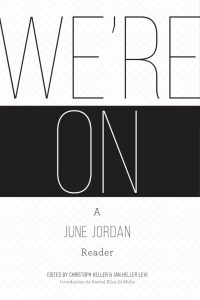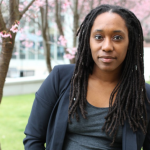 An Archival Mothering
An Archival Mothering
We’re On: A June Jordan Reader, Christoph Keller and Jan Heller Levi, Eds.
Review by Shawn(ta) Smith-Cruz
For this memoriam, Jordan’s ode begins immediately. At first glance the cover is simply black and white, but a closer look reveals the art of a soft grey woven whisper of a (maternal) quilt or distant fence, fraught with possibility. This webbed image set to full bleed, anchored by a black band, is how one enters. Whereas in most books the front matter of praise and accolades, copyright, partial list of works, and embedded quotes may be overlooked, for this reader, each phrasing is curated to unveil Jordan’s life and memory as a collection of archival deposits, evidential of her lyricism and many entanglements.
Rachel Eliza Griffiths slams her introduction to Jordan. Written as a performance-memoir-ode, we learn that poetry saved Griffith’s life, and the quest for survival came to her after Jordan’s death. She writes,
I was twenty-four years old when June Jordan died in Berkeley, California in 2002. During those years, frequently hospitalized for dissociative and mental health ruptures, I wrote poetry and dreamt secretly, frustrated by my inability, then, to heal myself from depression and aggravated sexual traumas. Simply, I mostly wanted to die (41).
Griffiths juxtaposes her life-saving with Jordan’s life transition. It is in this ultimate survival way that the reader approaches Jordan’s life when reading We’re On. It’s archival resonance illustrates a chronology of her life’s impact draped over the politics of our current lives. Griffiths continues, “the things that have tried to kill Jordan have not killed her spirit or her mind. Her life resurrects itself in the language, whenever any of us speak her words into the air she no longer breathes” (43).
Editors Christoph Keller and Jan Heller Levi were archival curators, framing this life into compartments, like acid-free boxes, each section a collection, contextualized with a finding-aid-like description. The text then acts as a rendering of Jordan’s contributions as a writer, community member, poet, daughter, activist, mother – terms that would act as keywords or metadata. When presenting the Reader, Keller and Levi offered, “a healthy sampling of June Jordan’s fighting and loving words” (50) but when describing their editorial choices, explained, “centered, not finished, able to make changes: that is how we approached choosing, and placing, texts from the vast body of Jordan’s writings” (51). Their efforts were a clear and masterful culling.
So do not be surprised that this review cannot be about June Jordan. It took a series of labor to garner permissions, to bridge themes from within Jordan’s very own canon, weave together select excerpts, to finally allow for a digestive monograph. Aiming to summarize Jordan’s work here would be inadequate. Yet I attest that the collection did the work well and by entering its pages, the reader will find a comprehensive overview, a good sense initiated into the realm of those who know Jordan if not also, her work.
The book structure is, if I may, a kind of mothering. As a reader, we are held and led down her sloped timeline of responsiveness to political upheaval, growing as we move through, nurtured with biographical notes, calmed by editorial interludes, and challenged by reinforcing language that mirrors Jordan’s direct prose. The use of excerpted pieces allows one to dip in and out of fiction, or performance, or poetry with the tools necessary to learn more, elsewhere. Also, the section headers and summations create a story atop the June Jordan story – one that acknowledges the journey, struggles, alliances, and progressions of a one-of-a-kind American woman. Therefore the craft is in the format, and within the format is a mapping.
I found my mother
her geography
becomes our home (82).
Jordan’s poetry is filled with imagery of motherhood and daughterhood. As the reader continues to enter this commentary of the world that is Jordan’s family life, of the world inside her own mind, “of the world everywhere,” an immersion occurs (166). Suddenly, the book gives birth to one who is incapable of differentiating experiences as a black person, a woman person, a mother person, or a bisexual person. We become Jordan’s intersectionality. And as if we be the children, hungry for more, the editors of We’re On: A June Jordan Reader mother us there.
Consider the Queen
her babies pullin at the nipples
pullin at the momma milk (174).
We’re On : A June Jordan Reader
Edited by Christoph Keller and Jan Heller Levi
Alice James Books, 2017, $24.95[paper]
ISBN 9781938584350
 Shawn(ta) Smith-Cruz is one of two proud lesbian moms of Paige-Joey Deshawn Cruz, born from a tumultuous pregnancy and cesarean-section delivery in May 2017. Shawn is an Assistant Professor at the Graduate Center Library of CUNY. Her MLS (Archives) and MFA (Fiction) are from Queens College.
Shawn(ta) Smith-Cruz is one of two proud lesbian moms of Paige-Joey Deshawn Cruz, born from a tumultuous pregnancy and cesarean-section delivery in May 2017. Shawn is an Assistant Professor at the Graduate Center Library of CUNY. Her MLS (Archives) and MFA (Fiction) are from Queens College.
